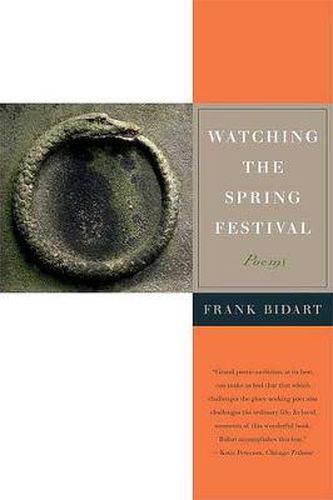Readings Newsletter
Become a Readings Member to make your shopping experience even easier.
Sign in or sign up for free!
You’re not far away from qualifying for FREE standard shipping within Australia
You’ve qualified for FREE standard shipping within Australia
The cart is loading…






This is Frank Bidart’s first book of lyrics–his first book not dominated by long poems. Narrative elaboration becomes speed and song. Less embattled than earlier work, less actively violent, these new poems have, by conceding time’s finalities and triumphs, acquired a dark radiance unlike anything seen before in Bidart’s long career.
Mortality–imminent, not theoretical–forces the self to question the relation between the actual life lived and what was once the promise of transformation. This plays out against a broad landscape. The book opens with Marilyn Monroe, followed by the glamour of the eighth-century Chinese imperial court (seen through the eyes of one of China’s greatest poets, Tu Fu). At the center of the book is an ambitious meditation on the Russian ballerina Ulanova, Giselle, and the nature of tragedy. All this gives new dimension and poignance to Bidart’s recurring preoccupation with the human need to leave behind some record or emblem, a made thing that stands, in the face of death, for the possibilities of art.
Bidart, winner of the 2007 Bollingen Prize in American Poetry, is widely acknowledged as one of the significant poets of his time. This is perhaps his most accessible, mysterious, and austerely beautiful book.
$9.00 standard shipping within Australia
FREE standard shipping within Australia for orders over $100.00
Express & International shipping calculated at checkout
Stock availability can be subject to change without notice. We recommend calling the shop or contacting our online team to check availability of low stock items. Please see our Shopping Online page for more details.
This is Frank Bidart’s first book of lyrics–his first book not dominated by long poems. Narrative elaboration becomes speed and song. Less embattled than earlier work, less actively violent, these new poems have, by conceding time’s finalities and triumphs, acquired a dark radiance unlike anything seen before in Bidart’s long career.
Mortality–imminent, not theoretical–forces the self to question the relation between the actual life lived and what was once the promise of transformation. This plays out against a broad landscape. The book opens with Marilyn Monroe, followed by the glamour of the eighth-century Chinese imperial court (seen through the eyes of one of China’s greatest poets, Tu Fu). At the center of the book is an ambitious meditation on the Russian ballerina Ulanova, Giselle, and the nature of tragedy. All this gives new dimension and poignance to Bidart’s recurring preoccupation with the human need to leave behind some record or emblem, a made thing that stands, in the face of death, for the possibilities of art.
Bidart, winner of the 2007 Bollingen Prize in American Poetry, is widely acknowledged as one of the significant poets of his time. This is perhaps his most accessible, mysterious, and austerely beautiful book.